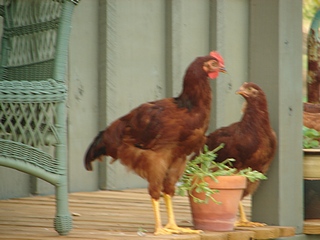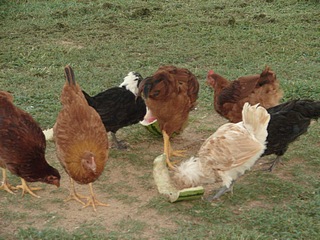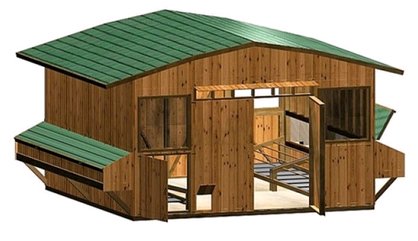Raising Free Range Chickens
What constitutes raising free range chickens? In the U.S. it is unfortunately a very broad statement. The USDA standards for labeling chicken "free range" is that the animal has access to the outside.
They do not define what "outside" and "access"mean. Unfortunately, at many major farms this means that birds are still crowded in buildings and that "outside" can be a small gate that most cannot gain access to.
For the birds that can gain access, it is too often a small area that is covered in gravel with no vegetation.
I know, I was disappointed too. When you hear raising free range chickens you like to picture birds grazing through fields of beautiful clover in the sunshine. Not exactly the case. There are farms out there that do the best they can.
Do a little research and buy from people who do it like you imagined it being done. The more we support people doing it the right way, the more of them that will exist.
If you are raising chickens, free ranging your birds is a good way to go. Why would you go to the trouble of raising free range chickens? Well, the eggs or meat have a greater nutritional value.
Mother Earth News did a study of the nutritional value in eggs when comparing commercial eggs and free range eggs that were produced correctly (not like the ones mentioned above).
They found that free range eggs contained:
So as you can see, there are many benefits. The next question is if many commercial producers are not doing it right, how do I go about raising free range chickens the right way?
Chances are you are already doing a pretty good job if you have your own backyard flock.
What standards should free range meet?
They should have:
Chances are you are doing most of this with your backyard flock already. The addition of free ranging can be pretty simple and there are many ways to go about it.
What we do is give the chickens a chance to graze in the yard every day. The chicken coop was established as their home early on with our birds, so they naturally come back to it at dusk every night in order to roost.
There really was no rocket science to the equation. We have enough room for this to be effective. On the other hand, if you live in a subdivision in the suburbs, this may not be an option for you.
However, if you do have the room and are looking to build a new coop I'd like you to know that I recently previewed a couple coop plan resources.
I know everyone brags about their plans so I wanted to help simplify the process for you. Click the image below to read the review...
If space is a problem, a good alternative, although I don't know if you would really consider it true "free range" (I've heard people argue both ways) is a chicken tractor.
This has wheels that you can move to different parts of the limited space that you do have. It gives your chickens a different range of grass, bugs, etc. to eat and also will keep them from pecking in their own fecal matter.
It is good for your yard (receiving free natural fertilizer) and it also is keeping your birds from scratching up your yard in one place.
I've seen many combination's to this method as well. I've seen people who have a fenced in backyard that keep the birds in a chicken tractor a majority of the time, but for example on weekends, when they can keep a better eye on them, they let them roam in the backyard.
What may be some of the disadvantages of raising free range chickens?
The one major disadvantage of free ranging is the risk of predators.

When you are raising free range chickens they are most at risk of becoming an easy meal for a predator, especially from the sky.
Most predators that will get your chickens in the daylight are hawks and owls. You can also add domestic dogs to the mix of daytime attackers.
Coyotes, foxes, raccoons, and many others usually do the dirty work at night, when hopefully your chickens are in the protection of their coop.
People all have methods designated for their own area that will protect their free range chickens. I have been told that dogs can be trained to look after a flock instead of going after them.
I've never seen this in action, but I have heard that it is possible. Obviously, it would take a special, well trained dog for such work.
Roosters will go out of the way to protect their flock. They are usually more keen about attackers from the air (hawks and owls) when hens are not.
They do a good job of protecting the hens by getting their attention when there is danger. But if you live in a neighborhood or city the rooster may not be an option.
If neither of the above is an option you still have the chicken tractor. If you are away, keep the birds in the chicken tractor.
If you are around let your birds roam and keep an eye out for hawks and other birds that could get your chickens. You will usually see these predators watching first.
They will usually stake out your birds for a while before they come in for the kill. Use your senses to protect your birds.
Raising free range chickens can give you great tasting and nutritious eggs. It is good for your grass when done appropriately and can be fun.
You get to see the real personalities of your birds when they are not caged. You get to see them react to their environment around them, and you, in a much different way. Do the best you can with what you have and most importantly, have fun!
Return from Raising Free Range Chickens to Organic Chickens

Custom Search





New! Comments
Have your say about what you just read! Leave me a comment in the box below.